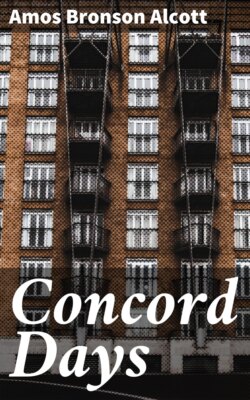Читать книгу Concord Days - Amos Bronson Alcott - Страница 9
На сайте Литреса книга снята с продажи.
Оглавление"A sweet self-privacy in a right soul
Outruns the earth, and lines the utmost pole."
For a diary, slight arches will suffice to convey the day's freight across; the lighter these, the speedier and more graceful the transit. Any current event, passing thought, rumor, were transportable, if simply dispatched. And the more significant, as the more familiar and private. Life were the less sweet and companionable if cumbered with affairs, overloaded with thought, dizzied with anxieties. Better the quiet temper that takes the days as they pass, and as if an eternity were vouchsafed for completing one's task, the time too short to waste in murmurs or postponements.
"Cares, like eclipses, darken our endeavors;
Our duties are our best gods."
A quiet life furnishes little of incident; dealing with thoughts and things in a meditative manner, it has the less for those who have a more stirring stake in current affairs. Yet one fancies that what interests himself may interest others of like mind, if not of like pursuits; and more especially when, as in a diary, he writes only of what has some real or imagined relation to what concerns him. His record may be careless, inconsequent, like the days it chronicles, with but the slender thread of sleep connecting its leaves; or perhaps the newspaper, once an accident, and coming irregularly, links his evening with morning, morning with evening; newspaper before breakfast, before business, before sleep; daily bread. One almost defines his culture, his social standing, by the journals he takes. Observe the difference between persons and neighborhoods familiar with current newspapers and those who are not. Very different from the times when a country boy must ride his miles after his Saturday's work to get some glimmering of what was passing in the great world around him; before libraries and lectures were established, steam and lightning were carriers and couriers for all mankind. No life is insular now. Every thought resounds throughout the globe. Electricity competes with thought in the race. The telegraph, locomotive, the press, render cabinets and colleges almost superfluous. Travel makes all men countrymen, makes people noblemen and kings, every man tasting of liberty and dominion. And who but the kings themselves can unking themselves?
Still, like most things, our periodical literature is far from being a pure benefit, and one may quote Plato's saying as applicable to the superficial culture which this of itself fosters: "Total ignorance were in no wise a thing so vile and wicked, nor the greatest of evils; but multifarious knowledge and learning acquired under bad management, causes much more harm."
Rather what is thought and spoken in drawing-rooms, clubs, in private assemblies, best intimates the spirit and tendencies of a community. Things are known but at second-hand as represented in public prints, or spoken on platforms. Admitted to private houses, one may report accurately the census of civility, and cast the horoscope of the coming time. Nor do I sympathize with some of my friends in their dislike of reporters. One defends himself from intrusion, as a general rule; but where the public have a generous interest in one's thoughts, his occupations and manners, the discourtesy is rather in withholding these from any false modesty. Besides, the version is more likely to be nearer the truth than if left to chance curiosity, which piques itself all the more on getting what was thus withheld, with any additions the mood favors.
